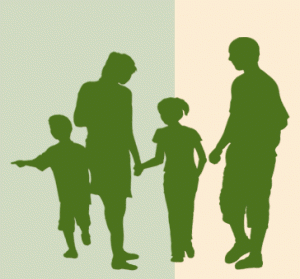How To Speak With Your Family About Your Eating Disorder
 If you have finally come to terms with the fact that you have an eating disorder, what do you do next? Of course you will want to get some support and most likely that will include help from your family.
If you have finally come to terms with the fact that you have an eating disorder, what do you do next? Of course you will want to get some support and most likely that will include help from your family.
But talking about your eating disorder with family can be a very difficult thing to do. Also, sometimes family relationships are dysfunctional and may contribute to the eating disorder. It may, in some cases, be better to talk to other trusted friends or professionals.
The truth is there is no hard and fast rule as to how to approach speaking with your family about your eating disorder but in this article we will talk with Sandy* and find out how she broached the subject with her family members.
Speaking With Your Family About Your Eating Disorder May Be Scary
“For me, when I realized I had an eating disorder and sought outpatient treatment for it, it took me a while to tell my parents and brother about it. To be honest, I didn’t exactly feel safe talking about my weight or my eating habits with my family. They’d long ago given up on talking to me about it because I pushed them away when they did. It was too painful and I felt so judged. So actually come to them and talk about this stuff was extremely uncomfortable, even scary.”
Sandy decided to wait until she had been seeing a therapist for a few months to let her parents know what was going on. She also enlisted the help of the therapist to formulate a plan for how to go about speaking to her family. They scheduled a session to talk with her family together.
Enlisting Support Is Important
“I wanted to tell my family in person. This was possible because we all live in the same city. I basically said, ‘I need to tell you all something very important. When can we meet?’ It was important for me that we met on “neutral ground” which translated into the therapist’s office. It wouldn’t have been appropriate to meet somewhere public and to be at my house or their house would have set us up for old patterns of communication. Plus, since I was one and they were three, I wanted some back up. I really didn’t know how my family would react.”
The meeting went well with Sandy’s therapist creating boundaries for the conversation.
Having A Conversation With Family Is A Step In Recovery
“I wouldn’t say it solved anything, but telling my parents was a big step in my recovery. I really had to own that I had a problem and I made myself vulnerable by sharing this information with them. It was great to have the therapist there too because she could help them understand what I was going through and what kinds of things they could do that would and wouldn’t be helpful. She guided them towards ways that they could actually support me because a lot of times people mean well but they just make things worse.”
Since Sandy revealed her eating disorder to her parents she has continued to be in treatment and recovery.
“Telling your family might not be the best option for everyone. Some of the people I have talked to had really unsupportive family members and they had to distance themselves from their relatives. I guess I was lucky to have such a supportive family. Still, it’s not something we talk about every day and I still get uncomfortable about eating around them sometimes. But now I have better coping mechanisms and it’s all out on the table. Keeping the secret was way worse.”
Advice On How To Talk To Your Family About Your Eating Disorder
When asked what advice she’d give to anyone contemplating speaking to their family about their eating disorder, Sandy said this: “I guess the biggest thing I’d share with someone thinking about telling their family about an eating disorder is to make sure they are ready to do it. I’d say, make sure that they have resources and support in place for after the discussion. This could be a therapist or a friend or a support group, but first you have to be ready to do it and then you want to have support outside of your family to work through whatever happens during the conversation. Both wonderful and difficult things happened during my conversation with my family and I was glad I had set up appointments with my therapist beforehand to process it all.”
*To protect her identity, Sandy’s true name has not been used
 Eating Disorder Self Test. Take the EAT-26 self test to see if you might have eating disorder symptoms that might require professional evaluation. All answers are confidential.
Eating Disorder Self Test. Take the EAT-26 self test to see if you might have eating disorder symptoms that might require professional evaluation. All answers are confidential.